Transcendent and Creepy: Rich Horton on The Forever War by Joe Haldeman
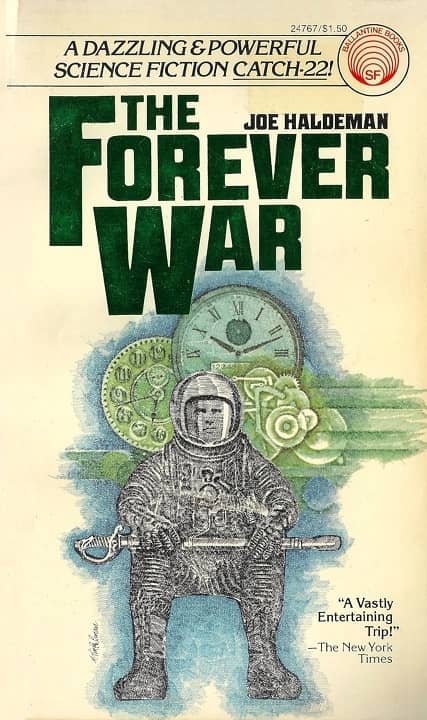 |
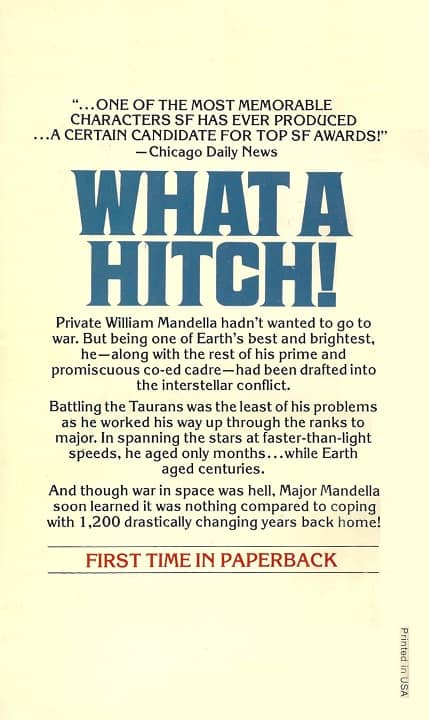 |
The Forever War (Ballantine Books, 1976). Cover by Murray Tinkelman
Rich Horton continues to review classic science fiction novels at his blog, Strange at Ecbatan. Last month he turned his attention to Joe Haldeman’s The Forever War, on the 50th anniversary of its release.
It’s definitely worth reading — a bitter and cynical look at war, some cool ideas including the effect of time dilation and lots of physics, a somewhat transcendent but pretty creepy conclusion. And, also, some very ’70s things, including pretty questionable — at times downright offensive — “sexual revolution” era sexual politics, and oddly 70s-ish notions of dystopia. My impression… I liked it then and I endorsed its Hugo and Nebula wins.
The Forever War is one of the most honored science fiction novels of all time. First published by St. Martin’s Press in 1975, it swept every major SF Award, including the Hugo, Nebula, and Locus awards. In 1987 it placed 18th on Locus’ list of All-Time Best SF Novels, beating out The Martian Chronicles, Starship Troopers, and Rendezvous with Rama. It’s been in print nearly continuously for the last four and a half decades. Here’s some of the most noteworthy editions.
[Click the images for bigger versions.]
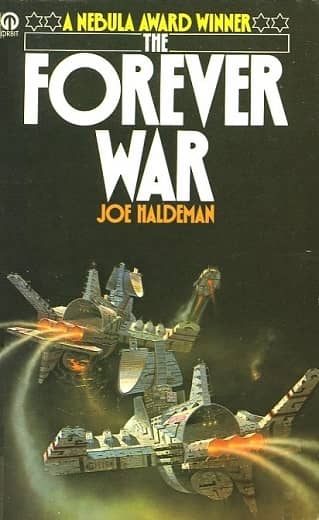 |
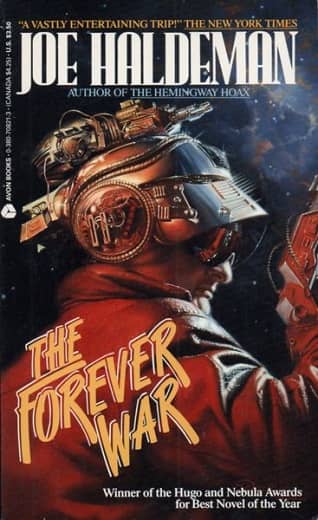 |
 |
 |
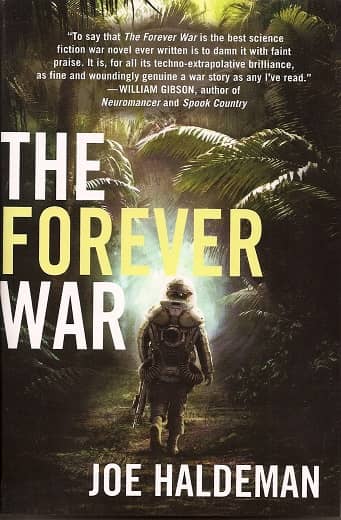 |
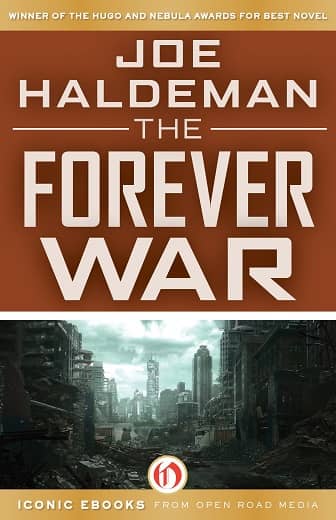 |
Three decades of The Forever War. First row: Orbit (1976), the first unexpurgated edition (Avon, 1991),
and the Gollancz SF Masterworks edition, with Author Notes (1999). Covers by Patrick Woodroffe,
Dorian Vallejo, and Chris Moore. Second row: Eos (2003), St. Martin’s Griffin (2009), and
Open Road (2014). Covers by Jim Burns, Tomislav Tikulin, and Michel Vrana.
So what’s the book about? Here’s Rich again.
William Mandella is drafted into a war against the aliens, there are several very impressive battle scenes, he falls in love with fellow soldier Marygay Potter, they are separated by time dilation, the war ends when it is realized the whole thing was a mistake due to poor communication, Marygay waits for William by flying back and forth in a spaceship until time dilation means their timelines are synchronized again…
What did I think on a reread? It’s still a pretty effective book. The telling is cynical in a totally believable way. The Army scenes ring very true — and Haldeman would certainly be a better authority than me anyway. The soldiers are foulmouthed, dislike their commanding officers, but fairly disciplined if only because the alternative is dying…
It’s very exciting, and well-written. The battle setups are interesting, and seem like a plausible use of the technology Haldeman invents. Some of this tech is pretty implausible, but in an almost believable fashion. The new section, originally called “You Can Never Go Back”, concerns William and Marygay’s return to Earth after their battles, at which time they are eligible to muster out. They describe at thoroughly decayed Earth society, in a very ’70s fashion. Homosexuality is [encouraged] as a population control measure (though — as Mandella even points out — birth control is pretty easy to enforce anyway.) Haldeman’s depiction of homosexuality is mostly positive, I suppose, but there are some cliches, which I understand he regretted in later years. The rest of the depiction of Earth at that time seems a bit over the top — but partly it’s a device to make it plausible that the two of them reup.
As Rich notes in his review, the early (pre-1991) editions of The Forever War were significantly abridged, omitting the entire middle section. The 1991 edition restored most of the expurgated sections, but left some some clumsy changes from the early edits intact. It wasn’t until 1997 that Avon published a version that Haldeman considered definitive.
See the complete details on the publishing history of The Forever War here at Black Gate, and read Rich’s complete review at his blog here.
I have read The Forever War twice; once when it was new, and again with my monthly sf/f reading group in 2016. I liked it both times, as its “Make War No More” message (to quote Joe Kubert and/or Sgt. Rock) resonates with me. And the hard sf feel was well maintained even as the technology got hand-wavey.
But the sexuality issues were more problematic, in the 2016 re-read. I might have had a spit-take when I hit the line about the sanctioned recreational “orgies”, wherein the military command “unleashed Stargate’s eighteen sex-starved men on our women, compliant and promiscuous by military custom (and law)”. And this bit survived into the 1997 edition, which was 6 years after the infamous Tailhook sexual assault scandal? Sheesh.
Homosexuality as a “cure” for overpopulation was not unique to Mr. Haldeman. I recall Dr. Asimov, in one of his science essays, discussing homosexuality as precisely a biological response to overpopulation. And, yes, that was the “liberal” sf wing speaking. I hope we have progressed somewhat in the intervening half-century.
Somehow, all of those visionaries so worried about overpopulation in the ’70s did not imagine the worldwide drop in (male reproductive cell) counts that’s happening naturally to keep us in check. I wonder if that was because the notion was too fantastic, or because the idea was too personally uncomfortable for the visionaries.
Why do you assume it’s natural, rather than due to a variety of pollutants, perhaps including some of pharmaceutical origin?
Because it’s happening all over the world, seemingly at the same general rates, regardless of levels or types of pollutants in the given locations, regardless of the types and accesses to pharmaceuticals in a given culture. The only truly global pollutants involve volcanic emissions and sunlight (even radioactive exposure from the Fat Man, Little Boy, and various power plant melt-downs is proving far patchier than we thought), and though those aren’t the sort of natural I was originally talking about, they still are natural.
Hmmm … Pretty sure the last time I read Forever War was a copy I pulled off of the library shelf well before 1991. Might have to check out the definitive version one of these days …
It’s been nearly 15 years since I read The Forever War, but it remains one of the most impactful literary experiences I’ve ever had. In fact, I’ve, to some extent, avoided a re-read, because I am concerned that the more critical mindset I’ve grown into over the ensuing years will tarnish my memory. This is, of course, silly, however the context around that first reading would be impossible for me to replicate, and I believe that said context is the largest reason for the book’s impact on me.
I was 19 years old, on my first deployment to Afghanistan, jealously watching my peers navigate college via Facebook, trying (and failing) to maintain my first “serious” relationship long distance, and entirely tied up in knots about the ethics of the mission I was performing. In my memory, every theme Haldeman introduced felt like it had been mined directly from the veins of emotion and thought running through me. Of particular significance was the feeling that I was watching my peers advance through their lives while I was trapped in another world (one with its own relationship to time). Given Haldeman’s service, perhaps I shouldn’t have been so surprised by my kinship with the story, but, at the time, the only thing I “knew” (incorrectly) about the story was that he wrote it as a “Take that!” to Starship Troopers.
I do recall the passages about homosexuality and the racial mixing being something of an eyebrow raiser for me, but I don’t remember anything particularly odious about the way those turns were written. Mandella is certainly weirded out by these developments, but, in my head, his discomfort was tied to his lack of recognition of the society he was notionally “defending” during his sojourns. To me, it never read as homophobic or racist, but I’d be lying if I said trepidation about this (and, you know, the ever-increasing backlog of unread books on my shelf) wasn’t holding me back from digging my copy out of old footlocker.